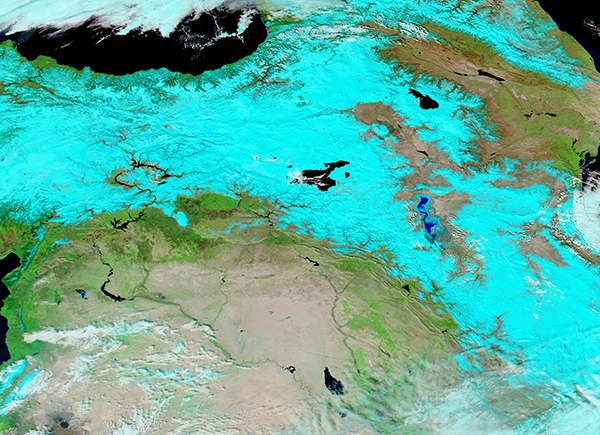Images
February 16, 2023 - Swath of Snow South of the Black Sea
Tweet
By mid-February 2023, a large swath of snow covered the highlands south of the Black Sea, stretching from the Anatolian Peninsula and across the Caucasus and southward over the Zagros Mountains, thanks to several January and February snowstorms.
The Moderate Resolution Imaging Spectroradiometer (MODIS) on board NASA’s Aqua satellite acquired a false-color image of the widespread winter scene on February 14. In this type of image snow looks electric blue, vegetation bright green, open land is tan and water varies with depth, from light blue to dark inky blue. Cloud typically looks white, but high cloud that carries ice crystals may be tinted with light electric blue.
Snow covers seven countries in this image. Beginning in the east, at the shores of the Caspian Sea, and moving westward they are Azerbaijan (north) and Iran (south), Georgia (touches the Black Sea), Armenia, Iraq, Turkey (south of the Black Sea), and Syria. The countries can also be located by the prominent lakes and reservoirs. In the northeast, snow surrounds the dark waters of Lake Sevan, Armenia. Lake Van, Turkey sits to the west and slightly south of Lake Sevan. The snake-like lakes surrounded by snow west of Lake Van are reservoirs on Turkey’s portion of the Euphrates River, including the large Karakaya Dam Reservoir. As the Euphrates flows southward, it expands into another reservoir, Lake Assad, which is Syria’s largest lake. Moving south and east, a tear-drop-shaped lake, Lake Tharthar, sits in Iraq. The lake with the most unusual appearance is Lake Urmia, Iran. The rich blue-toned waters of this saline lake are surrounded by a ring of bright electric blue. While it looks much like snow, the color ringing Urmia more likely comes from the highly-reflective mineral crust that covers the lake edge.
Image Facts
Satellite:
Aqua
Date Acquired: 2/14/2023
Resolutions:
1km (2.2 MB), 500m (5.6 MB), 250m (3.6 MB)
Bands Used: 7,2,1
Image Credit:
MODIS Land Rapid Response Team, NASA GSFC
Tweet
By mid-February 2023, a large swath of snow covered the highlands south of the Black Sea, stretching from the Anatolian Peninsula and across the Caucasus and southward over the Zagros Mountains, thanks to several January and February snowstorms.
The Moderate Resolution Imaging Spectroradiometer (MODIS) on board NASA’s Aqua satellite acquired a false-color image of the widespread winter scene on February 14. In this type of image snow looks electric blue, vegetation bright green, open land is tan and water varies with depth, from light blue to dark inky blue. Cloud typically looks white, but high cloud that carries ice crystals may be tinted with light electric blue.
Snow covers seven countries in this image. Beginning in the east, at the shores of the Caspian Sea, and moving westward they are Azerbaijan (north) and Iran (south), Georgia (touches the Black Sea), Armenia, Iraq, Turkey (south of the Black Sea), and Syria. The countries can also be located by the prominent lakes and reservoirs. In the northeast, snow surrounds the dark waters of Lake Sevan, Armenia. Lake Van, Turkey sits to the west and slightly south of Lake Sevan. The snake-like lakes surrounded by snow west of Lake Van are reservoirs on Turkey’s portion of the Euphrates River, including the large Karakaya Dam Reservoir. As the Euphrates flows southward, it expands into another reservoir, Lake Assad, which is Syria’s largest lake. Moving south and east, a tear-drop-shaped lake, Lake Tharthar, sits in Iraq. The lake with the most unusual appearance is Lake Urmia, Iran. The rich blue-toned waters of this saline lake are surrounded by a ring of bright electric blue. While it looks much like snow, the color ringing Urmia more likely comes from the highly-reflective mineral crust that covers the lake edge.
Image Facts
Satellite:
Aqua
Date Acquired: 2/14/2023
Resolutions:
1km (2.2 MB), 500m (5.6 MB), 250m (3.6 MB)
Bands Used: 7,2,1
Image Credit:
MODIS Land Rapid Response Team, NASA GSFC




